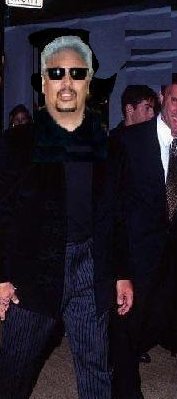
Martin Scorsese, the Oscar-winning director, is to make a film about Frank Sinatra's life. After two years of wrangling with the singer's family on how to tell his colourful story. Sinatra has been portrayed several times on screen, including by Ray Liotta in the 1998 film The Rat Pack, but there has never been a feature film devoted to his life.
No actor has yet been announced for the lead role but initial speculation has focused on Leonardo Di Caprio, who has starred in four previous Scorsese films. Cathy Schulman, the co-producer of the new film, provisionally titled "Sinatra", said it would be "an unconventional biopic". It remains to be seen how Scorsese, like Sinatra an Italian-American, tackles the most contentious area of the singer's life – his reported links with the Mafia.While Scorsese has made several Mob-related films such as Goodfellas, the involvement of Sinatra's family – his daughter, Tina, is executive producer in the new project – has prompted speculation that it will steer clear of this area.
"In any family, you're dealing with a precious life, and in this case, you're dealing with an extraordinary life," said Miss Schulman.
"We knew Scorsese would lead the troops to a true, fair, exciting and entertaining portrait of the man."
A screenplay, based on 30,000 pages of research, has been written by Phil Alden Robinson, who won an Oscar nomination for Field of Dreams, the sentimental Kevin Costner film about an Iowa farmer who builds a baseball pitch in a field.
"It's not a cradle-to-the-grave traditional portrait of the consecutive events in a man's life," said Miss Schulman, president of Mandalay Pictures, which is making the film with Universal Pictures. "Instead, it's more of a collage and, in many ways, it will feel like an album itself. It's a collection of various moments and impressions in his life and together we hope they'll tell the full story and present full themes."
It took two years to secure the rights to Sinatra's life and music.
Warner Music Group and the Sinatra estate are partners on the project.
Sinatra's daughter, Tina, said it was "personally pleasing" to know Scorsese would oversee the celluloid version of her father's life story.
The FBI kept a file on Sinatra for decades, detailing his heavy drinking, bouts of depression, liaisons with prostitutes and his friendship with various Mafia bosses.
The singer and actor, who died in 1998, performed on more than 1,400 musical recordings, was awarded 31 gold records and earned 10 Grammys.
He made his first recording in 1939 and continued recording almost until his death, being responsible for such classics as "Strangers in the Night" and "My Way".
He also appeared in 58 films and won a supporting-actor Oscar for From Here to Eternity in 1953.
No actor has yet been announced for the lead role but initial speculation has focused on Leonardo Di Caprio, who has starred in four previous Scorsese films. Cathy Schulman, the co-producer of the new film, provisionally titled "Sinatra", said it would be "an unconventional biopic". It remains to be seen how Scorsese, like Sinatra an Italian-American, tackles the most contentious area of the singer's life – his reported links with the Mafia.While Scorsese has made several Mob-related films such as Goodfellas, the involvement of Sinatra's family – his daughter, Tina, is executive producer in the new project – has prompted speculation that it will steer clear of this area.
"In any family, you're dealing with a precious life, and in this case, you're dealing with an extraordinary life," said Miss Schulman.
"We knew Scorsese would lead the troops to a true, fair, exciting and entertaining portrait of the man."
A screenplay, based on 30,000 pages of research, has been written by Phil Alden Robinson, who won an Oscar nomination for Field of Dreams, the sentimental Kevin Costner film about an Iowa farmer who builds a baseball pitch in a field.
"It's not a cradle-to-the-grave traditional portrait of the consecutive events in a man's life," said Miss Schulman, president of Mandalay Pictures, which is making the film with Universal Pictures. "Instead, it's more of a collage and, in many ways, it will feel like an album itself. It's a collection of various moments and impressions in his life and together we hope they'll tell the full story and present full themes."
It took two years to secure the rights to Sinatra's life and music.
Warner Music Group and the Sinatra estate are partners on the project.
Sinatra's daughter, Tina, said it was "personally pleasing" to know Scorsese would oversee the celluloid version of her father's life story.
The FBI kept a file on Sinatra for decades, detailing his heavy drinking, bouts of depression, liaisons with prostitutes and his friendship with various Mafia bosses.
The singer and actor, who died in 1998, performed on more than 1,400 musical recordings, was awarded 31 gold records and earned 10 Grammys.
He made his first recording in 1939 and continued recording almost until his death, being responsible for such classics as "Strangers in the Night" and "My Way".
He also appeared in 58 films and won a supporting-actor Oscar for From Here to Eternity in 1953.








